Starlink Statistics For 2024
Starlink was started in 2019. Starlink provides high-speed Internet using Low Earth Orbiting (LEO) satellites. SpaceX runs Starlink. The goal is to be able to provide satellite-based cell phone service after 2023.
In 2023, Starlink had 2 million subscribers and had an estimated $9 Billion (US) in revenue with over 5000 satellites in orbit.
Starlink has 99% uptime with maximum download speeds that rival cable. Starlink Internet provides high-speed Internet in areas such as rural, camping, marine, and even airplanes.
Key Takeaways
- 2 million subscribers
- 5,469 satellites
- $9 billion in revenue
- 220 Mbps download speed
- 6.65 Mbps upload speed
- 99.9 reliability
- 53.7 million remote works in US
- 49.9 million rural population in US
- 7 different plans for home and business users
Table Of Contents
- Total Subscribers
- Total Satellites
- Starlink Plans
- Starlink Revenue
- Internet Access Speeds
- Starlink Subscribers Per Country
- Internet Speed Comparison
- Starlink Speed By Country
- Internet Reliability Comparison
- Remote Workers In U.S.
- Rural Population U.S.
- Comparing Starlink With Fixed Wireless Access
- Conclusion
Starlink Subscribers
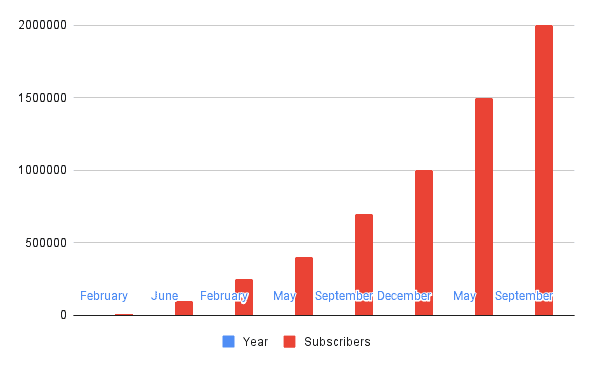
| Year | Month | Subscribers |
|---|---|---|
| 2021 | February | 10000 |
| 2021 | June | 100000 |
| 2022 | February | 250000 |
| 2022 | May | 400000 |
| 2022 | September | 700000 |
| 2022 | December | 1000000 |
| 2023 | May | 1500000 |
| 2023 | September | 2000000 |
Starlink has consistently added subscribers since the launch of the service in 2021. The service provides access to rural areas without access to traditional high-speed cable internet service.
With the added capability to be used in mobile situations, including airplanes, the growth of subscribers are not just people living off-grid in cabins in the woods.
Sources
- https://www.cnbc.com/2021/02/04/spacex-starlink-satellite-internet-service-has-over-10000-users.html
- https://www.zdnet.com/article/spacex-president-says-starlink-global-satellite-broadbrand-service-to-be-live-by-september/
- https://www.youtube.com/watch?v=xpl_JnG7rcg
- https://advanced-television.com/2022/09/19/starlink-has-700000-subs/
- https://twitter.com/SpaceX/status/160487293697
- https://twitter.com/starlink/status/1654673695007457280
- https://www.bigtechwire.com/2023/09/24/starlink-announces-2-million-active-subscribers-growth-going-geometric/
Total Satellites
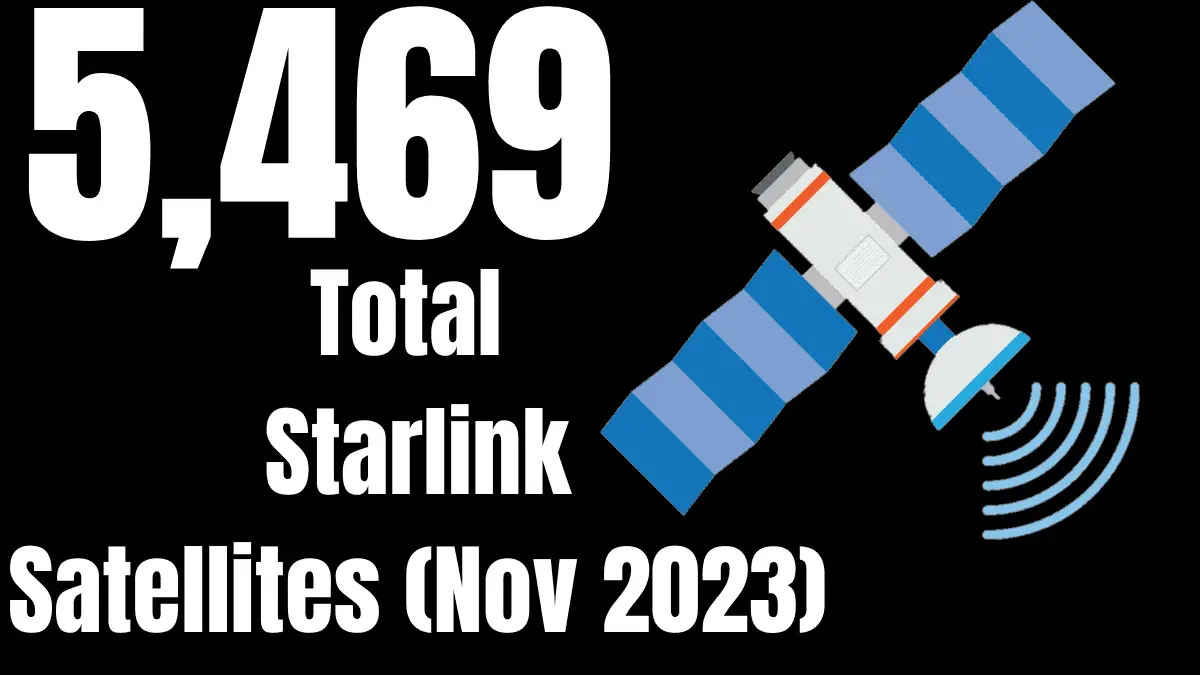
SpaceX currently has 5,469 satellites (as of November 2023) in orbit. This is a remarkable achievement. Competitors who wish to challenge Starlink, whether it’s a legacy provider like HughesNet or a new competitor such as Amazon’s Kuiper, will need a similar-sized constellation to provide similar coverage.
The astronomy community is concerned with how these constellations will affect their ability to do their research. The initial Starlink satellites were quite visible with the naked eye. We saw them regularly on campouts.
SpaceX and the National Science Foundation (NSF) have an agreement to mitigate the effects in the future.
Sources
Starlink Plans
Personal
- Residential
- Roam
- Boats
Business
- Fixed Site
- Land Mobility
- Maritime
- Aviation
Starlink has 7 different plans. Three (Residential, Roam, and Boats) are for home users.
Roam is intended for people who are traveling in RV, living the #vanlife, or camping. As a frequent camper, I am used to seeing the DirectTV and Dish satellite receivers next to an RV. I imagine I’ll start seeing Starlink receivers as well.
There are four options for businesses. These include Fixed Site, Land Mobility, Maritime, and Aviation
Per the page on SpaceX’s website, the aviation is for private airplanes like Gulfstream G650. This would indicate that any use of Starlink on a commercial jetliner like a 737 would be handled through direct sales.
Sources
Starlink Revenue
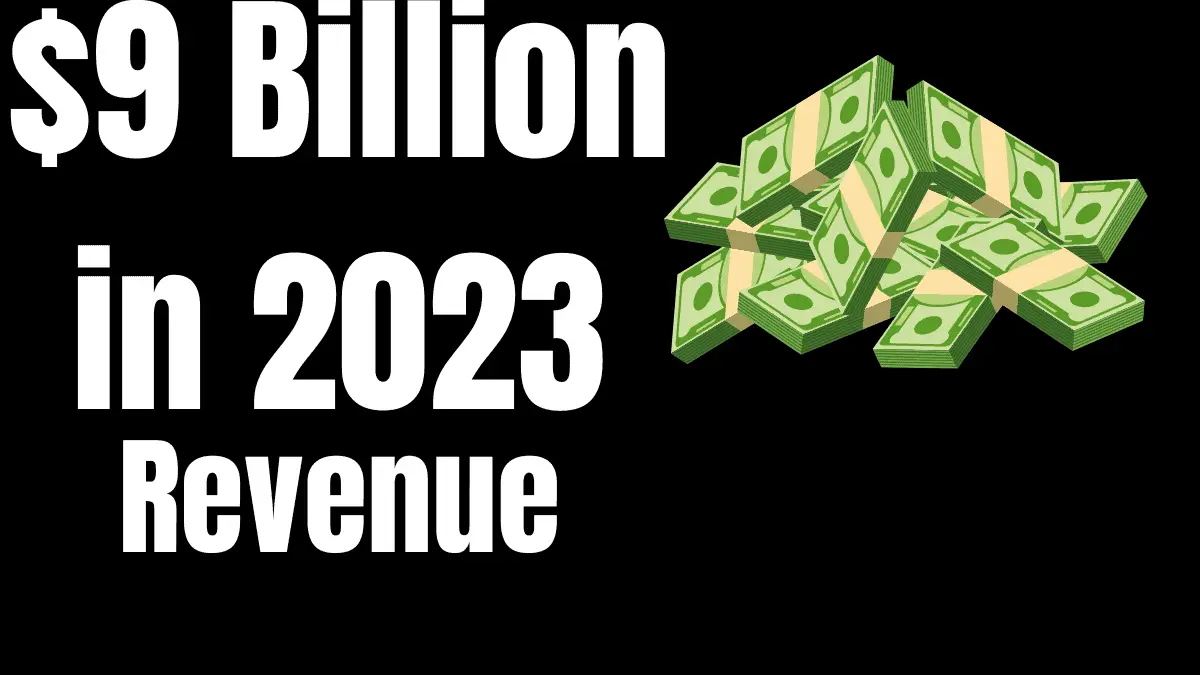
Starlink earned $9 billion in 2023 per Bloomberg News. SpaceX President and Chief Operating Officer Gwynne Shotwell said that Starlink turned a profit in Q1 of 2023 per CNBC. These are competitive headwinds similar to what new streaming services face when competing against Netflix.
Satellite providers must launch their own satellites (possibly having to use SpaceX to launch) and attract customers, while Starlink is already servicing customers at a profit.
Sources
Comparing Satellite Speeds
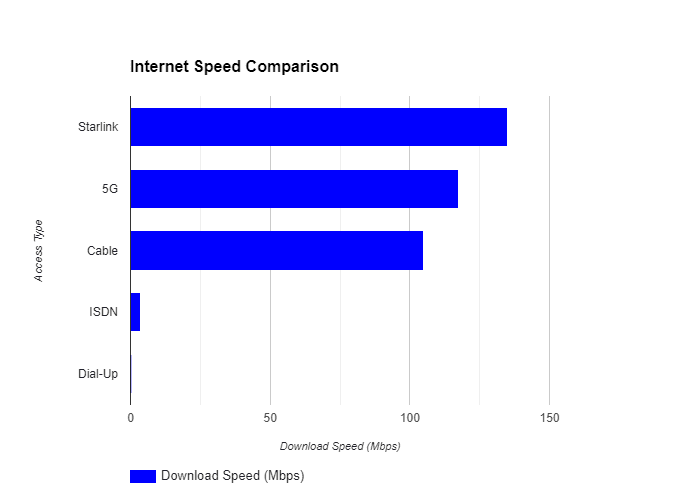
| Internet Type | Download Speed | Upload Speed | Latency |
|---|---|---|---|
| Starlink | 25-220 Mbps | 5-25 Mbps | 20-90 ms |
| Viasat | 12-150 Mbps | 3 Mbps | 150-400 ms |
| HughesNet | 15-50 Mbps | 3 Mbps | 250-500 ms |
| OneWeb | 50-100 Mbps | 20-50 Mbps | 100-150 ms |
Starlink is double the speed of its current rival on the fastest speed. Starlink also has the least amount of latency.
I was personally skeptical that Starlink would work well based on my experience with initial satellite internet. I am no longer skeptical based on my experience with Starlink on 2 separate cruises.
I have spent entire days drinking cocktails while watching YouTube on a sea day in the middle of a Caribbean cruise. My day job is in IT and I have almost 40 years of experience.
There should be more competition for Starlink in the future, including legacy and new entries. Internationally, China is planning to build its own competitor.
Sources
Starlink Subscribers Per Country
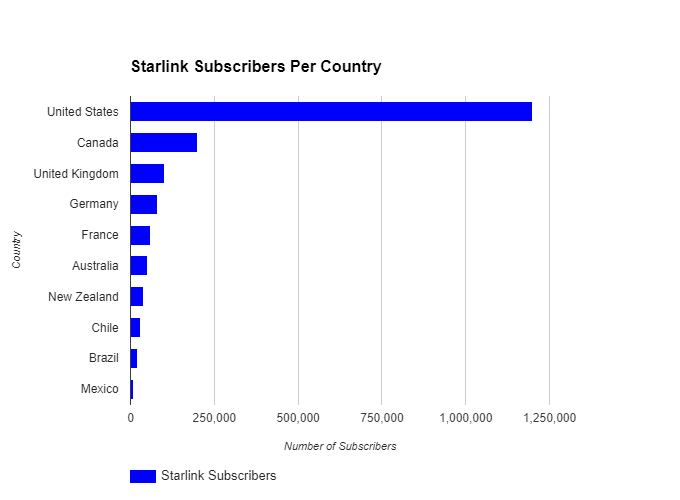
| Country | Estimated Number of Starlink Subscribers |
|---|---|
| United States | 1,200,000 |
| Canada | 200,000 |
| United Kingdom | 100,000 |
| Germany | 80,000 |
| France | 60,000 |
| Australia | 50,000 |
| New Zealand | 40,000 |
| Chile | 30,000 |
| Brazil | 20,000 |
| Mexico | 10,000 |
The subscriber numbers demonstrate that Starlink is an international product. It feels magical that you can have high speed internet in the middle of the Amazon (assuming you have a clear enough sky) or the Australian Outback. Much less anywhere in the US.
Sources
Internet Speeds
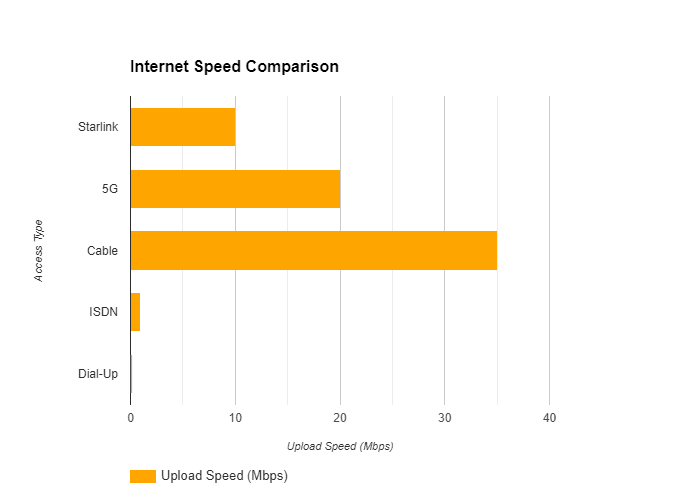

| Internet Type | Median Download Speed (Mbps) | Median Upload Speed (Mbps) |
|---|---|---|
| Starlink | 50-220 | 6.65-13.45 |
| 5G | 35-200 | 10-30 |
| Cable | 60-150 | 20-50 |
| ISDN | 1.5-6.0 | 0.64-1.28 |
| Dial-Up | 0.05-0.50 | 0.03-0.30 |
Cable is still the fastest speed though based on personal experience, I’m not sure how many people really see those max speeds.
Both Starlink and 5g speeds are good enough and will improve as technology improves. Many years ago I worked on building software to assist phones in moving from cellular to WiFi and back. I believe we will see in the next decade similar technology to move from satellite and cellular. Satellite could have the best download speeds for content but it feels like cellular would still be better for voice calls.
Sources
Compare Starlink Speeds In Different Countries
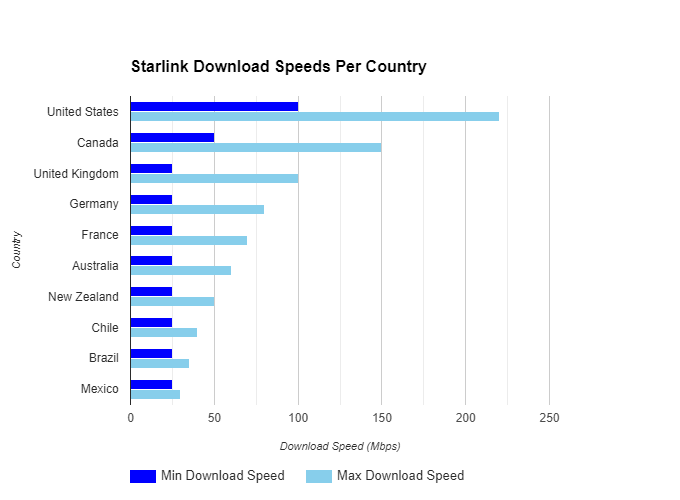
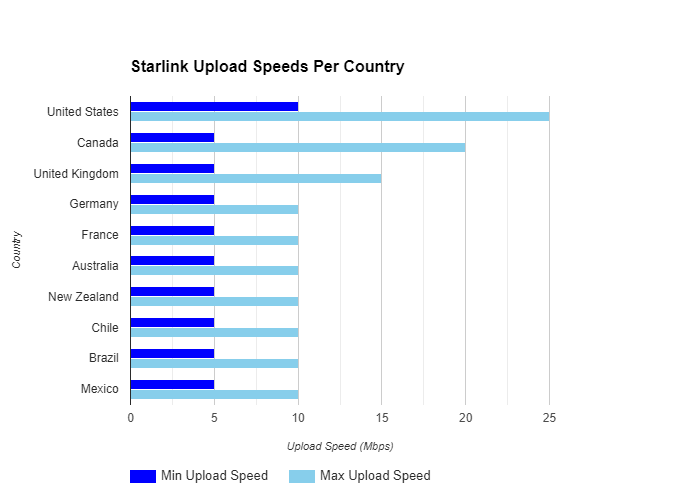
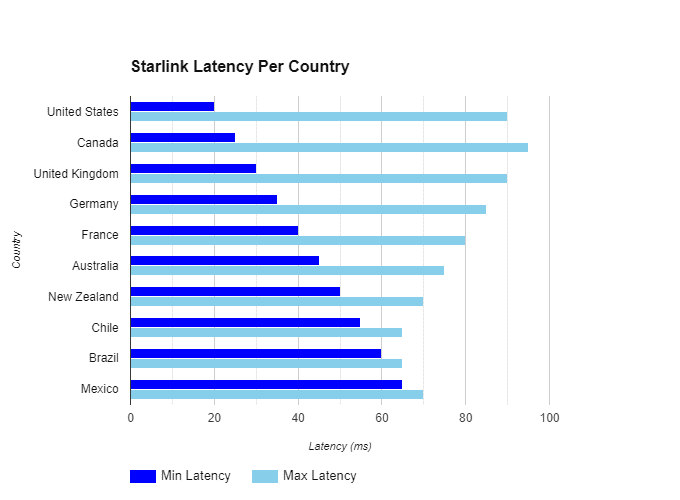
| Country | Download Speed (Mbps) | Upload Speed (Mbps) | Latency (ms) |
|---|---|---|---|
| United States | 100-220 | 10-25 | 20-90 |
| Canada | 50-150 | 5-20 | 25-95 |
| United Kingdom | 25-100 | 5-15 | 30-90 |
| Germany | 25-80 | 5-10 | 35-85 |
| France | 25-70 | 5-10 | 40-80 |
| Australia | 25-60 | 5-10 | 45-75 |
| New Zealand | 25-50 | 5-10 | 50-70 |
| Chile | 25-40 | 5-10 | 55-65 |
| Brazil | 25-35 | 5-10 | 60-65 |
| Mexico | 25-30 | 5-10 | 65-70 |
You can see from the speeds that Starlink is consistent across the globe. You can also see where the constellation is optimized for. I imagine speeds will improve across the globe over time.
But considering that many places in the world don’t have any high-speed Internet, even if Starlink speeds are not as fast as they are in the USA, they are still a large improvement.
Sources
Comparing Internet Reliability
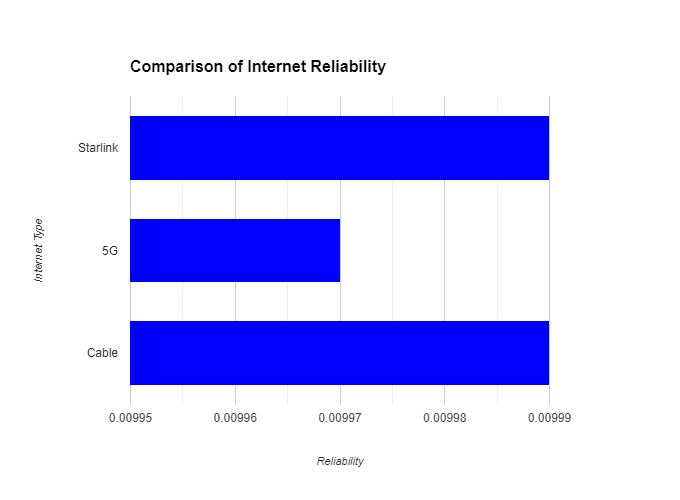
| Internet Type | Reliability |
|---|---|
| Starlink | 99.9 |
| 5G | 99.7% |
| Cable | 99.9% |
Starlink is almost as reliable as cellular or cable Internet.
The reliability is more dependent upon weather than the other options. But I also have lost cable internet for a week at home because of a lighting strike on a box a mile away from my home.
And during the Texas ice storm, we lost cell towers when the entire electrical grid went down for a week.
Sources
Remote Worker Population In US
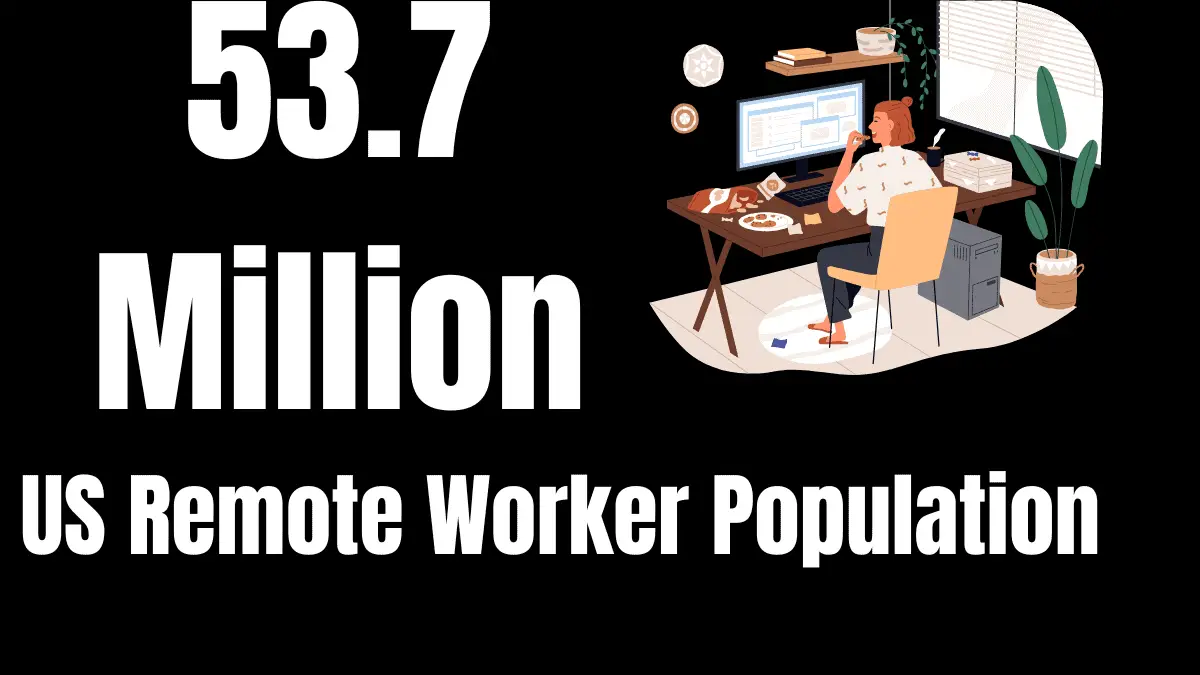
53.7 million (2023)
Even with more companies requiring the return to the office, it’s hard to imagine that remote work has not been well established.
High-speed Internet from services like Starlink will expand the area where remote work will be possible. And it won’t be restricted to only the US. Nor will it be restricted to traditional outsourcing countries such as India or the Philippines because Starlink works worldwide.
Sources
Rural Population In US
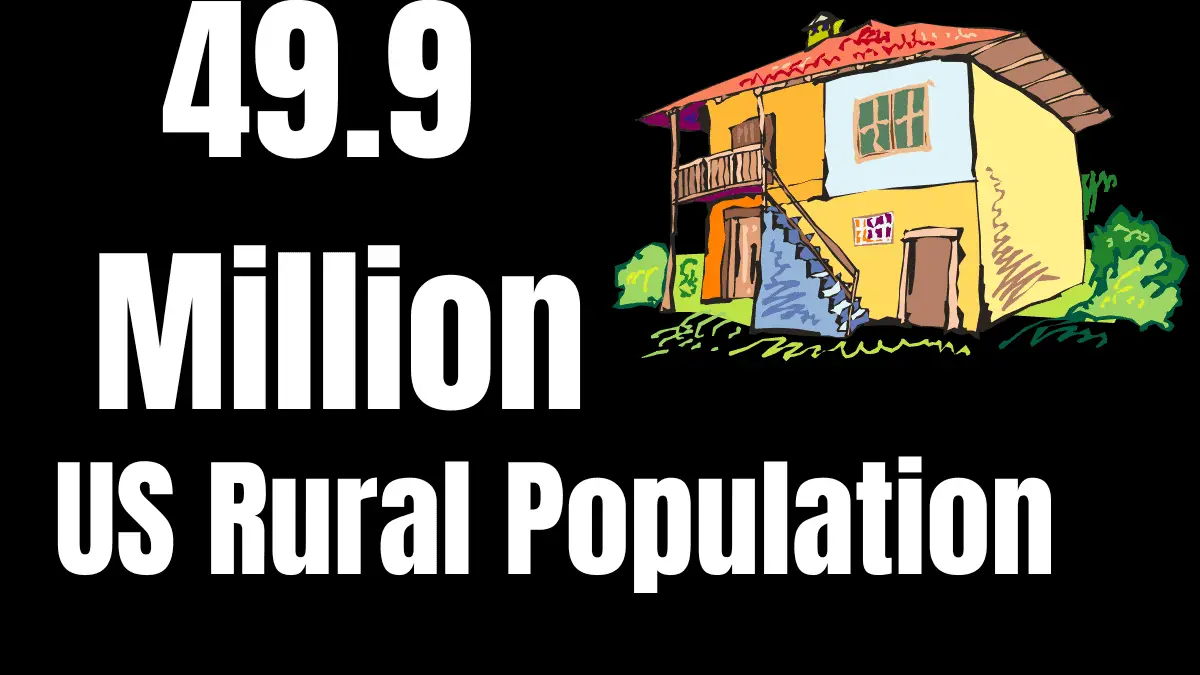
49.9 million (2022)
With the price of housing continuing to rise in urban environments, rural areas are more attractive. But the lack of high-speed internet is a limiting factor in choosing where to live if your job depends upon having access to high-speed Internet.
From personal experience, I appreciate the desire to be away from society. But on the other hand I like to watch TV shows, football, and do video calls with family.
Sources
Comparing With Fixed Wireless Access (FWA)
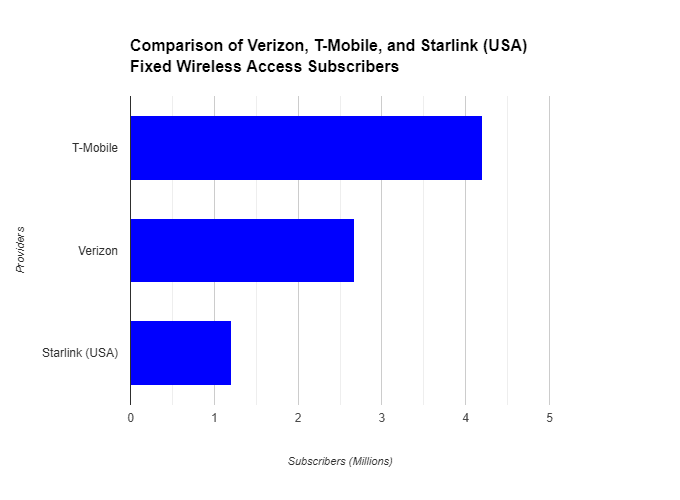
| Provider | Subscriber |
|---|---|
| Starlink | 2 million |
| T-Mobile | 4.2 million |
| Verizon | 2.67 million |
One day I noticed a strange contraption on top of my neighbor’s house. I later learned it was a Fixed Wireless Access (FWA) point for a new cellular Internet provider.
FWA uses 5G technology to provide high-speed Internet. It can offer higher speeds but with the restriction that your receiver must be in point-to-point contact with a cell phone tower.
I believe FWA is the best competitor to satellite Internet for rural communities because it doesn’t require laying cable. I also imagine it’s much cheaper to build out than launching and operating satellites in space.
Verizon and T-Mobile are the leaders in FWA.
AT&T appears to still focus on their cable Internet.
T-Mobile is partnering with Starlink.
Sources
Conclusion
With 2 million subscribers, over 5,000 satellites and $9 billion in revenue Starlink is a strong competitor for wireless high-speed Internet access.
Starlink enables consumers and businesses to access streaming content and even upload data from almost anywhere on the planet including the middle of the ocean.